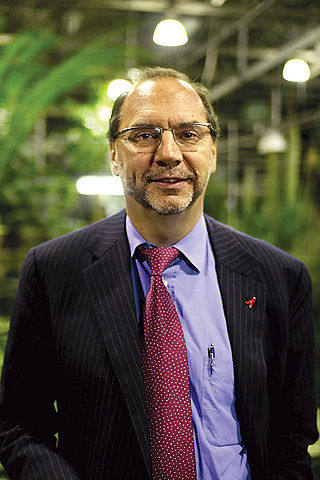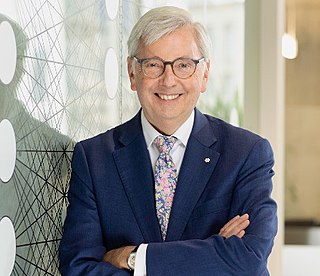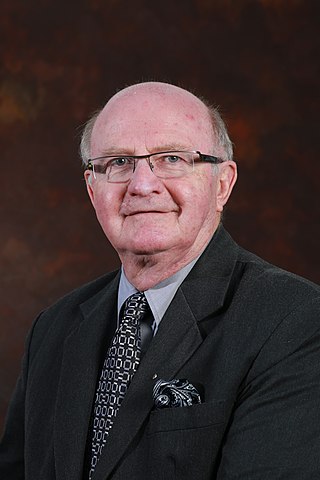Related Research Articles

James Jude Orbinski is a Canadian physician, humanitarian activist, author, and scholar in global health. Dr. Orbinski began his role as principal of Massey College at the University of Toronto in the 2024-2025 academic year, where he is also Full Professor in the Department of Family and Community Medicine in the Temerty Faculty of Medicine, and is cross-appointed to the Munk School of Global Affairs and Public Policy, as well as the Dalla Lana School of Public Health,. Previously a professor in the Faculty of Health Science at York University, Dr. Orbinski founded the Dahdaleh Institute of Global Health Research.

Sir Peter Karel, Baron Piot is a Belgian-British microbiologist known for his research into Ebola and AIDS.
Phil Gold is a Canadian physician, scientist, professor and author.
Louis Siminovitch was a Canadian molecular biologist. He was a pioneer in human genetics, researcher into the genetic basis of muscular dystrophy and cystic fibrosis, and helped establish Ontario programs exploring genetic roots of cancer.
John Robert Evans was a Canadian cardiologist, academic, businessperson, and civic leader.
Joseph Louis Rotman was a Canadian businessman and philanthropist. Rotman was the founder, benefactor and member of organizations such as the Clairvest Group Inc., the Rotman Research Institute, the Rotman School of Management, and the Rotman Institute of Philosophy. Throughout his life, he received three honorary degrees, as well as an induction into the Canadian Business Hall of Fame. He is well-regarded for donating his time and financial assistance to numerous philanthropic causes including the arts, education and healthcare.

The Canadian Institutes of Health Research is a federal agency responsible for funding health and medical research in Canada. Comprising 13 institutes, it is the successor to the Medical Research Council of Canada.

Stephen John Toope is a Canadian legal scholar, academic administrator and a scholar specializing in human rights, public international law and international relations. In November 2022, he was appointed as the fifth president and CEO of the Canadian Institute for Advanced Research (CIFAR). Prior to this, he served for five years as the 346th Vice-Chancellor of the University of Cambridge.
The Canadian Institute for Advanced Research (CIFAR) is a Canadian-based global research organization that brings together teams of top researchers from around the world to address important and complex questions. It was founded in 1982 and is supported by individuals, foundations and corporations, as well as funding from the Government of Canada and the provinces of Alberta and Quebec.

Lorne Allan Babiuk, is a Canadian scientist specializing in immunology, pathogenesis, virology, molecular virology, and vaccinology. He is the Vice-President of Research at the University of Alberta and the former Director of the Vaccine and Infectious Disease Organization at the University of Saskatchewan. Dr Babiuk holds the Canada Research Chair in Vaccinology and Biotechnology and is Chair of the Board for Pan-Provincial Vaccine Enterprise (PREVENT), a vaccine development company.

Victor Joseph Dzau is a Chinese-American doctor and academic. He serves as the President of the United States National Academy of Medicine of the United States National Academy of Sciences and Vice Chair of its National Research Council. He is Chancellor Emeritus and James B. Duke Professor of Medicine at Duke University and former president and chief executive officer of Duke University Medical Center.

Michael R. Hayden, is a Killam Professor of Medical Genetics at the University of British Columbia, the highest honour UBC can confer on any faculty member. Only four such awards have ever been conferred in the Faculty of Medicine. Hayden is best known for his research in Huntington disease (HD).

Stanley Howard Zlotkin, is a Canadian Professor of Paediatrics, Public Health Sciences and Nutritional Sciences at the University of Toronto.

Quarraisha Abdool Karim is an infectious diseases epidemiologist and co-founder and Associate Scientific Director of CAPRISA. She is a Professor in Clinical Epidemiology, Columbia University, New York and Pro-Vice Chancellor for African Health, University of KwaZulu-Natal, South Africa.
Francis Allan Plummer was a Canadian scientist, academic and HIV/AIDS researcher. He was "a recognized specialist in infectious diseases whose work influenced public health policy in Canada and abroad". He was Distinguished Professor Emeritus of Medicine and Medical Microbiology at the University of Manitoba and Scientific Director General, National Microbiology Laboratory.
Éric A. Cohen is a Canadian molecular virologist whose research is focused on human immunodeficiency virus (HIV)-host interactions that govern viral replication and persistence.
B. Brett Finlay, is a Canadian microbiologist well known for his contributions to understanding how microbes cause disease in people and developing new tools for fighting infections, as well as the role the microbiota plays in human health and disease. Science.ca describes him as one of the world's foremost experts on the molecular understanding of the ways bacteria infect their hosts. He also led the SARS Accelerated Vaccine Initiative (SAVI) and developed vaccines to SARS and a bovine vaccine to E. coli O157:H7. His current research interests focus on pathogenic E. coli and Salmonella pathogenicity, and the role of the microbiota in infections, asthma, and malnutrition. He is currently the UBC Peter Wall Distinguished Professor and a Professor in the Michael Smith Laboratories, Microbiology and Immunology, and Biochemistry and Molecular Biology, and Co-director and Senior Fellow for the CIFAR Humans and Microbes program. He is also co-author of the book Let Them Eat Dirt: Saving Your Child from an Oversanitized World and The Whole-Body Microbiome: How to Harness Microbes - Inside and Out - For Lifelong Health. Finlay is the author of over 500 publications in peer-reviewed journals and served as editor of several professional publications for many years.
Colleen M. Flood is the Dean of Queen's University Faculty of Law.

James (Jim) Woodgett is a British-born biologist and the Principal Investigator of an active research laboratory at the Lunenfeld-Tanenbaum Research Institute, Sinai Health System, in Toronto, Ontario, Canada. He was the Koffler Director of Research at the Lunenfeld-Tanenbaum Research Institute from November 2005 to January 2021.
Nubia Muñoz is a Colombian medical scientist and epidemiologist, whose research has been instrumental in establishing that human papillomavirus (HPV) infection is the primary cause of cervical cancer which has led to the development of a vaccine that is capable of preventing 70% of all cervical cancers.
References
- ↑ "Alan Bernstein". Canadian Who's Who. Grey House Publishing Canada. Retrieved 7 October 2019.
- ↑ Gasner, Cynthia (May 15, 2008). "Oakwood CI marks 100 years". Canadian Jewish News.
- ↑ Kalvapalle, Rahul (June 10, 2019). "Pioneering health researcher Alan Bernstein receives U of T honorary degree". University of Toronto. U of T News. Retrieved 3 October 2019.
- ↑ Bernstein, Alan (1972). A Genetic Analysis of the TOL(A,B) Locus of Escherichia Coli K-12 (PhD thesis). University of Toronto. ProQuest 302687855.
- 1 2 Virginia, Gewin (November 8, 2007). "Physics student turned biomedical scientist becomes executive director of Global HIV Vaccine Enterprise". Nature. 450 (7167): 316. doi: 10.1038/nj7167-316a .
- ↑ "Alan Bernstein, OC, PhD - Canada Gairdner Wightman Award 2008". Gairdner. Retrieved 4 October 2019.
- ↑ Bernstein, Alan (October 12, 2017). "It's time for a bold new vision for Canadian fundamental science". Rogers Media. Maclean's. Retrieved 7 October 2019.
- ↑ Berkley, Seth (September 2010). "The 2010 scientific strategic plan of the Global HIV Vaccine Enterprise". Nature Medicine. 16 (9): 981–989. doi: 10.1038/nm0910-981 . PMID 20823883.
- ↑ "Global Call for Ideas". CIFAR. Retrieved 4 October 2019.
- ↑ Farrow, Jon (17 July 2019). "CIFAR announces public engagement initiatives". CIFAR. Retrieved 4 October 2019.
- ↑ "CIFAR is moving to MaRS!". CIFAR. Retrieved 4 October 2019.
- ↑ "Building an AI World: Report on National and Regional AI Strategies". CIFAR. Retrieved 8 May 2023.
- ↑ "CIFAR researcher Carolina Tropini is appointed Alan Bernstein Fellow". CIFAR. Retrieved 8 May 2023.
- ↑ "Who We Are: Scientific Advisory Committee". Bill & Melinda Gates Foundation. Retrieved 4 October 2019.
- ↑ "International Scientific Advisory Board". McGill University Health Centre. Retrieved 17 October 2024.
- ↑ Bernstein, Alan; Rossant, Janet (April 19, 2017). "A clear call to move Canadian research forward". The Globe and Mail. The Globe and Mail. Retrieved 4 October 2019.
- ↑ "Alan Bernstein: Doubt Everything" (Video). YouTube.com. November 5, 2015. Retrieved 4 October 2019.
- ↑ "Alan Bernstein, convocation 2019 honorary degree recipient" (Video). YouTube.com. June 14, 2019. Retrieved 4 October 2019.
- ↑ "Alan Bernstein - Honouree at Testimonial Dinner & Awards 2019" (Video). YouTube.com. April 12, 2019. Retrieved 4 October 2019.
- ↑ "Fellows". Royal Society of Canada. Retrieved 4 October 2019.
- ↑ McLaughlin Medal Archived 2011-03-05 at the Wayback Machine
- ↑ "GSC William F Grant and Peter B Moens Award of Excellence". Genetics Society of Canada. Retrieved 4 October 2019.
- ↑ "Australia honours Bernstein for his work in health research". Friends of CIHR. Retrieved 4 October 2019.
- ↑ "Officer of the Order of Canada". The Governor General of Canada. Retrieved 4 October 2019.
- ↑ "Queen Elizabeth II's Golden Jubilee Medal (2002)". The Governor General of Canada. Retrieved 4 October 2019.
- ↑ "Médaille du mérite de l'IRCM" (PDF). l’Institut de recherches cliniques de Montréal (IRCM). Retrieved 4 October 2019.
- ↑ "Alan Bernstein: Canada Gairdner Wightman Award 2008". Gairdner. Retrieved 4 October 2019.
- ↑ "Queen Elizabeth II's Diamond Jubilee Medal (2012)". The Governor General of Canada. Retrieved 4 October 2019.
- ↑ "Dr. Alan Bernstein, 2017 Friesen Prize". Friends of CIHR. Retrieved 4 October 2019.
- ↑ "The 2017 Appointees to the Order of Ontario". Province of Ontario, Ministry of Citizenship and Immigration. January 29, 2018. Retrieved 7 October 2019.
- ↑ "Testimonial Dinner and Awards 2019". Public Policy Forum. Retrieved 4 October 2019.
- ↑ "2000 - 2009 Honorary Degree Recipients". Dalhousie University. Archived from the original on 9 April 2019. Retrieved 4 October 2019.
- ↑ "2009 Honorary Degree Recipients". The University of British Columbia. Retrieved 4 October 2019.
- ↑ "Alan Bernstein". University of Ottawa. Retrieved 7 October 2019.
- ↑ "McGill to recognize outstanding individuals with honorary degrees". McGill University. May 17, 2010. Retrieved 4 October 2019.
- ↑ "Honorary degree recipients straddle science, politics". Queen's University. Queen's Gazette. May 21, 2013. Retrieved 4 October 2019.
- ↑ Dubois, Caroline (September 18, 2014). "Quatre personnalités reçoivent un doctorat honorifique". L'Université de Sherbrooke. Retrieved 4 October 2019.
- ↑ Farrow, Jon (February 28, 2019). "CIFAR President and CEO Dr. Alan Bernstein to receive honorary degree from the University of Toronto". CIFAR. Retrieved 7 October 2019.
- ↑ "Western to honour global academic, science and financial leaders at 313th Convocation". Western University. March 26, 2019. Retrieved 4 October 2019.